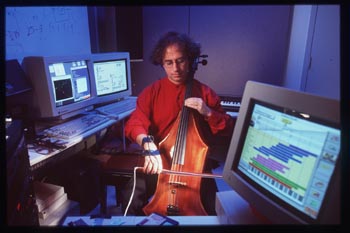![[MetroActive Music]](/gifs/music468.gif)
[ Music Index | Santa Cruz | MetroActive Central | Archives ]
Technical Expectations
Tod Machover boots up tech toys but freezes on a musical out-of-memory error
By Scott MacClelland
ARGUABLY, THE MOST common approach to understanding the meaning of music starts with a desire for the recognizable, the familiar. If that isn't available, the inquiring mind then looks for its own truth. This, in simple terms, defines the basic expectations we all have of music.
As part of UC-Santa Cruz's annual April in Santa Cruz survey of new music, Tod Machover of MIT's Media Lab offered a sampler of his music April 19 and left those who attended searching their minds for expectations not previously considered. What was one to make of the four works Machover presented? Or should one's mind be emptied of any expectations? Since the latter is impossible, one might start by considering the composer's pedigree.
For starters, the innovative MIT Media Lab means the focus of expectation might better be placed elsewhere than on musical content. Not only does MIT stand for technological advance, but to succeed there one must have uncommon skill at translating one's talents into money. Machover is at the least an effective entrepreneur, a winner of significant grants that buy him the time, to say nothing of the connections, upon which a career can be built.
Having then shifted the focus of expectation from art to technology, it takes no time to learn that one of Machover's goals--going back into the mid '80s at least--is the invention of new "hyperinstruments." Perhaps because he has been funded by toy companies, Machover has created a category of Music Toy, which, he writes, is "designed as an inexpensive, standalone sound producing and manipulating device, that gains power when networked with other Simple Things."
Fact is, Machover is just a big kid with a fascination for gadgets and gizmos. If his music doesn't hold up as art in any traditional sense, he makes no such pretense in the first place. He acknowledges that in essence by deliberately paraphrasing bits from the Bach cello suites in the middle of his otherwise noodling With Dadaji in Paradise for solo electrified cello.
Without enough structure to engage the intellect or performance expression to win over the emotions, technological novelty for its own sake wears out pretty fast. Put another way, at a performance's conclusion, whatever memory one has of the music quickly fades.
Future Music Blender, though listed on the concert program, was not ready for performance, so Machover climbed into his Sensor Chair to play an earlier piece. The chair sits within an array of vertical posts which stimulate computer sounds when the hands of the sitter penetrate their sensitivity fields. Thrusting a hand close to the post caused a strong and large sound, while wisping the hand at the periphery produced a softer and often longer-sustained tone. It was like watching a conductor in a chair leading an invisible orchestra of synthesized sounds.
Pianist Mary Farbood then sat at a Yamaha Disklavier concert grand with an electronic keyboard to her left (and Machover, like a puppeteer, behind it) to play Bounce, for hyperkeyboards and interactive electronics. The electronics played considerable material even while Farbood's hands were idle. Again, the musical result was mostly a novelty of wild and crazy sounds, and high-speed arpeggios and scales.
The program opened with Veronica Elsea playing computerized keyboard in husband Peter's Number Games with computer screen patterns projected overhead. Chris Chafe then played his Push Pull for electronic cello and interactive computer sounds. More moments without memory.
[ Santa Cruz | MetroActive Central | Archives ]
Copyright © Metro Publishing Inc. Maintained by Boulevards New Media.
![]()

Hyperreal: Wired classical composer and performer Tod Machover brought some of his 'hyperinstruments,' like his cello above, to UC-Santa Cruz's festival of new music,
April in Santa Cruz.
From the April 26-May 3, 2000 issue of Metro Santa Cruz.